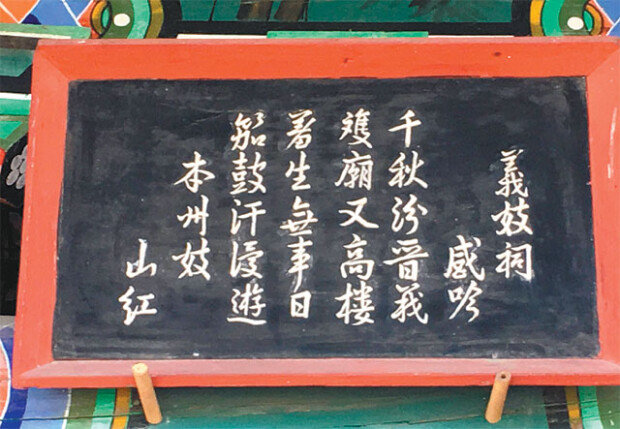The merits of patriotic kisaeng in Jinju
The merits of patriotic kisaeng in Jinju
Posted May. 04, 2019 07:55,
Updated May. 04, 2019 07:55

“Kisaeng are more of independence fighters than courtesans.” Imperial Japanese politician Ryo Chiba, who became as policing chief in Korea in September 1919, was concerned in a publication translated as “the behind-the-scenes stories of independence movement of Joseon” that Joseon kisaeng would make it harder to maintain policing security as they instill independent thought in the minds of young Joseon people.
Indeed, many kisaeng filled with patriotism took to the streets during the March 1st Movement across the country – particularly in Suwon, Gyeonggi Province as well as Tongyeong and Jinju in South Gyeongsang Province. Kim Hyang-hwa in Suwon, and Jeong Mak-rae and Lee So-seon in Tongyeong led the independence movement. Some historic records argue that Kim Hwang-hwa and Han Geum-hwa were leaders of the independence league of kisaeng in Jinju, which many have proved wrong. An explanation was delivered by Standing Director Kang Dong-wook of a corporate group of people who safeguard culture in Jinju, which hosts independence movement revival events of the independence leagues of kisaeng in Jinju and heroes. He said that Kim Hwang-hwa resided in Suwon and Han Geum-hwa did not live in Jinju, adding, regrettably, that it is not sure who led the independence league of kisaeng in Jinju although it is obvious that they played a critical role in Jinju.
Kim Hyang-hwa in Suwon, and Jeong Mak-rae and Lee So-seon in Tongyeong turned out to have been imprisoned for their involvement in the March 1st Movement, which later led to an awarding of a presidential commendation. There has not been any record of six kisaeng in Jinju caught during the independence movement and sent to prison. Chief researcher Chu Kyung-hwa in charge of local history at the Jinju Cultural Center delivered that family registers and trial records were destroyed at the Jinju Court of Law and Jinju City Hall due to fires during post-liberation riots and the Korean War. The researcher added to say that 80 to 90 percent of data kept in the Daegu Court of Review or today’s appellate court stay intact to date but most records on closed cases at the Jinju Court of Law were destroyed.
San Hong was a famous kisaeng in Jinju against Japanese colonialism before the March 1st Movement. According to Hwang Hyun’s “Maecheon Yarok,” Lee Ji-yong, one of Five Eulsa Traitors, fell for San Hong in Jinju, 1906, and asked her to become his concubine by handing over a great deal of money to her. San Hong strongly rejected his offer, saying, “Everyone calls you the head of the five traitors. I will never be a concubine of a traitor although I am a humble person.” Lee Ji-yong did not give up on her. In return, San Hong committed suicide after suffering from his continuous offering of fortune and blackmail, according to Confucian scholar Yang Hoi-gap’s collection of poems and writings titled “Jeongjaejip.”
Chief researcher Chu Kyung-hwa, who applied for a government reward for San Hong in 2016, argues that San deserves an order of merit or a medal of honor as she killed herself after struggling with a pro-Japanese traitor. He plans to make a second application after collecting citizens’ signatures as the current administration has promised to extend a range of independence patriots. The Uigisagameum written by San Hong hangs at Uigisa Shrine in Jinju Fortress that honors 16th-century Jinju kisaeng Nongae.
Dong-Ki Sung esprit@donga.com







